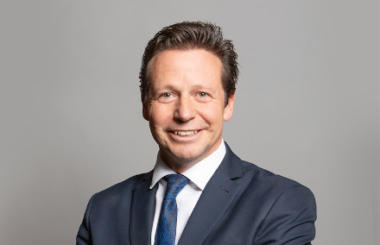Despite what some people say, the relationship between the government and charity sector is “not in a terrible state,” Nigel Huddleston said this morning.
The minister for civil society said that in his personal experience “there is a good relationship between the sector and government – but I want to make it even better”.
Huddleston was speaking in conversation with Gus O’Donnell at an event hosted by Pro Bono Economics.
Huddleston continued: “It’s in a good state but it could be a lot better. But it all goes down to engagement and engaging constructively, making decisions based on facts and information and data and being honest about where those gaps are.”
Charities need to lobby government with tangible data
The best way for charities to engage with the government is by displaying mutual respect and understanding, Huddleston said.
Huddleston became the minister for sport, tourism, heritage and civil society during a cabinet reshuffle last October. He said since being appointed he received “probably a couple of thousand” emails from civil society organisations within days of getting appointed.
Responding to every charity would be “just unmanageable,” he said.
Huddleston said the government is looking for charities that can provide facts and figures.
“It’s all about data, it’s all about the evidence, it’s all about building a case. Opinions are interesting and nice, but you need to back it up,” he said.
The minister acknowledged that it’s not always easy for charities to quantify their impact, which makes this difficult for them to feedback to the government.
“If the sector can provide me with data and information and evidence then I can do my job better in terms of making a case for the sector in government.”
When asked about how community groups can engage with the government more effectively, Huddleston advised: “Come as one voice because I can’t have 139,000 conversations with the sector. Come together, build an evidence base together and make sure the voice is channelled through some effective advocates.”
However, later in the discussion, he urged people to bring ideas to the government.
“I’m open to anyone coming to us with good ideas,” Huddleston said.
Charities should not be involved in political campaigning
When asked about charity campaigning rules Huddleston said the distinction between personal and professional was always obvious.
“People say it's controversial but I think it’s pretty simple and straightforward actually here. You [charities] shouldn’t be involved in party political campaigning, and it’s perfectly fine to campaign on policy areas as long as it’s aligned with your objectives of the charity,” Huddleston said.
However, the minister said he recognised that this is more complex in a digital age.
He added: “Most people can differentiate between their own party-political opinions and what they need to do as a job and we need to encourage it more.”
He emphasised that he does not think the issue is as complicated as others argue.
“I know people are saying ‘it’s so difficult’ but it’s like no, it isn’t,” Huddleston said.
‘There’s no such thing as government money’
O'Donnell asked the minister what was special about civil society that could not be done by the government.
He replied: “We all hear all the time that in an ideal world, the government would be doing this, but if government did it, it would come with baggage.”
Importantly, some charities, such as first aid or search and rescue charities “don’t want to be consumed by government”, he said.
Huddleston went on to suggest that charities, funded by non-statutory sources, could have different priorities to the state as whole.
He said: “There is no such thing as government money it’s the public’s money and there’s only so much of it and there’s only so much tolerance as well from the public to spend on other people’s priorities.”
Another reason the government cannot do what civil society does is that not all these good causes “have widespread public support”.
How does the minister find time for civil society among his other responsibilities?
Huddleston is also minister for several other areas, including youth, sport, heritage and tourism.
O’Donnell, who is the chair of Pro Bono Economics, asked the minister: “How do you do it all? How do you find time for civil society in all of that?”
Huddleston said he manages it all because he has a really good team around him. He said he was aware of the frustration surrounding which government department is responsible for civil society.
“I always say that I lead civil society but it’s a cross-government responsibility,” he said.
The event came to a close with Huddleston acknowledging the importance of the sector.
He said: “I am under no doubt of the value and importance of the sector and I speak on behalf of government in saying that. The role of civil society in the pandemic has made its value clearer than ever.”
Related articles











